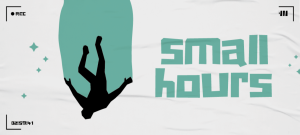Writer Ava Wong Davies talks about her show ‘Small Hours’, showing as part of IF Oxford

Sleep plays a vital role within our daily routines, the sleep-wake cycle a process forming one of our circadian rhythms – an internal 24hr clock supporting our survival. Delving into this cycle further in her new work Small Hours, showing online as part of IF Oxford from the 19th to 25th October, writer Ava Wong Davies talks about what inspired her to create the show, seeking scientific advice from the University of Oxford Sleep and Circadian Neuroscience Institute and how she’s found creating work during this time.
Hi Ava, your show Small Hours will be available to view online from the 19th to the 25th October as part of IF Oxford. How are you feeling ahead of the showing?
Excited! It’s been an intense but really rewarding process and I’m looking forward to seeing the results.
Small Hours ‘probes the mysteries of human circadian rhythm, the daily pattern of wakefulness and sleep, and how this can be either disrupted or adjusted’. What inspired you to explore this topic further?
What interests me about sleep is the way in which it is both productive and unproductive — you refuel from it, you can’t live without it, but while you are sleeping, you are unable to do anything else. That tension was interesting to me, and particularly when you consider the way we talk about sleep now — there’s often the idea that we need better sleep in order to work more effectively, when really you need sleep because you need rest, and that should be a good enough reason to sleep more and sleep better, without tying it to often quite unhealthy ideas of productivity.
The show is co-produced by IF Oxford and Oxford Playhouse. How have you found the support from both organisations?
Great! I was granted a lot of creative freedom in the process which has been brilliant, but I’ve always felt very supported by both organisations too.
The show was created with scientific advice from the University of Oxford Sleep and Circadian Neuroscience Institute. How did you find this part of the research process? What did you learn from the research gained?
It was fascinating to speak to the scientists from the Sleep and Circadian Neuroscience Institute — they answered all my stupidest, silliest little questions with real patience and were very supportive of the idea for the play too.
Performed by Mandala Theatre Company, the show was filmed over four days during the pandemic in different locations. How involved were you with this part of the process?
I wasn’t involved at all with the filming of the piece — I think it was a complex enough production without me getting in the way!
Directed by Yasmin Sidhwa and filmed by Ben Johnston, you’ve all had to bring this production together amid current restrictions. How have you found creating work during this time?
Very interesting and fruitful — obviously in an ideal world, I would have loved to have been in the rehearsal room with Yasmin, Mandala, and Ben, but the restrictions that were put in place pushed us to think more outside the box. I do miss the face to face contact that you get with live theatre, but I think the filmed aspect of the show actually ties in well with a lot of the themes that we explore.
What can audiences expect from the show?
It’s not a didactic show — I think it offers up a lot of ideas and questions but doesn’t try to answer them, and instead leaves those to the audience. It definitely feels like a piece that’s been created and conceived in lockdown — there is that sense of isolation, of trying desperately to connect to someone else but not quite being able to. Characters make strange, sometimes alienating decisions, and I think the piece can have this foggy, woozy feeling to it — like when you’ve been up all night and you’re sleepwalking through a workday.
What would you like for audiences to take away from the show?
I’d like it to provoke conversations around how we talk about sleep, rest, and work — why do we sleep, why do we need it, and how does it tie to how we think about work and rest more generally. Sleep isn’t just a personal thing — it’s affected by the systems around us.
Questions by Lucy Basaba.
Small Hours will be available to to stream as part of IF Oxford from Monday 19th until Sunday 25th October 2020. To find out more about the production, visit here…


Leave a Comment